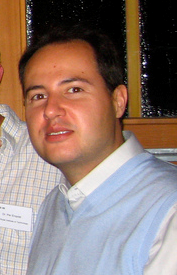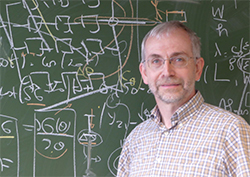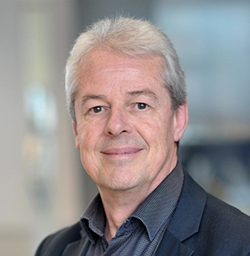Plenary speakers and slides
Plenary speakers at SYSID 2018 were Michael I. Jordan, Gianluigi Pillonetto, Johan Schoukens, Roy Smith, Paul M.J. Van den Hof and Csaba Szepesvári. The speakers and slides from their presentiations can be found below.
Slides
View all slides from the presentations at SYSID 2018.
Speakers
Michael I. Jordan

Professor,Department of Electrical Engineering and Computer Science and the Department of Statistics at the University of California, Berkeley, USA.
Title: On Gradient-Based Optimization: Accelerated, Stochastic and Nonconvex
Abstract: Many new theoretical challenges have arisen in the area of gradient-based optimization for large-scale statistical data analysis, driven by the needs of applications and the opportunities provided by new hardware and software platforms. I discuss several recent, related results in this area: (1) a new framework for understanding Nesterov acceleration, obtained by taking a continuous-time, Lagrangian/Hamiltonian/symplectic perspective, (2) a discussion of how to escape saddle points efficiently in nonconvex optimization, and (3) the acceleration of Langevin diffusion.
Michael I. Jordan is the Pehong Chen Distinguished Professor in the Department of Electrical Engineering and Computer Science and the Department of Statistics at the University of California, Berkeley. He received his Master’s in Mathematics from Arizona State University, and earned his PhD in Cognitive Science in 1985 from the University of California, San Diego. He was a professor at MIT from 1988 to 1998. His research interests bridge the computational, statistical, cognitive and biological sciences, and have focused in recent years on Bayesian nonparametric analysis, probabilistic graphical models, spectral methods, kernel machines and applications to problems in distributed computing systems, natural language processing, signal processing and statistical genetics. Prof. Jordan is a member of the National Academy of Sciences, a member of the National Academy of Engineering and a member of the American Academy of Arts and Sciences. He is a Fellow of the American Association for the Advancement of Science. He has been named a Neyman Lecturer and a Medallion Lecturer by the Institute of Mathematical Statistics. He received the IJCAI Research Excellence Award in 2016, the David E. Rumelhart Prize in 2015 and the ACM/AAAI Allen Newell Award in 2009. He is a Fellow of the AAAI, ACM, ASA, CSS, IEEE, IMS, ISBA and SIAM.
Gianluigi Pillonetto

Associate Professor,Department of Information Engineering, University of Padova, Italy.
Title: Regularized kernel-based strategies for system identification
Abstract: Classical techniques for system identification rely on parametric estimation paradigms coming from mathematical statistics, such as maximum likelihood and prediction error methods. Within this parametric paradigm, a key point is the selection of the most adequate model structure which is typically performed via complexity measures such as the Akaike’s criterion. Starting from the linear scenario, this talk will describe how the model selection problems can be successfully faced by a different approach to system identification that also leads to an interesting cross-fertilization with the machine learning field. In particular, we will discuss the use of Bayesian kernel-based methods where the impulse response is seen as a Gaussian process whose covariance (kernel) includes information on system stability. Within this paradigm, tuning of model complexity gets a whole new dimension and richness in the choice of (continuous) regularization parameters compared to the choice of (discrete) model orders. Extensions of such approach to robust identification problems will be also illustrated by relaxing the Gaussian assumptions on measurement noise and impulse response.
Gianluigi Pillonetto was born on January 21, 1975 in Montebelluna (TV), Italy. He received the Doctoral degree in Computer Science Engineering cum laude from the University of Padova in 1998 and the Ph.D. degree in Bioengineering from the Polytechnic of Milan in 2002. In 2000 and 2002 he was visiting scholar and visiting scientist, respectively, at the Applied Physics Laboratory, University of Washington, Seattle. From 2002 to 2005 he was Research Associate at the Department of Information Engineering, University of Padova, becoming an Assistant Professor in 2005. He is currently an Associate Professor of Control and Dynamic Systems at the Department of Information Engineering, University of Padova. His research interests are in the field of system identification, estimation and machine learning. On these topics, he has published around 60 papers in peer reviewed international journals.He currently serves as Associate Editor for Automatica and IEEE Transactions on Automatic Control. In 2003 he received the Paolo Durst award for the best Italian Ph.D. thesis in Bioengineering, and he was the 2017 recipient of the Automatica Prize.
Johan Schoukens

Department INDI, Faculty of Engineering, Vrije Universiteit Brussel, Belgium.Department of Electrical Engineering, Eindhoven University of Technology, Eindhoven, The Netherlands.
Title: Nonlinear System Identification. A User-Oriented Roadmap.
Abstract: Nonlinear system identification comes into the picture where linear system identification fails to address the users questions. The real world is nonlinear and time-varying, and in some applications these aspects can be no longer ignored so that linear models become imprecise, or do not reproduce essential aspects of the behavior of the system under test.
Nonlinear system identification is much more involved than the identification of linear systems. The experiment design is more tedious, the model structure selection is much more involved, and the parameter estimation is more difficult. For that reason, moving from the well established linear identification tools towards the more advanced nonlinear system identification methods is an important user decision that should be well informed because it significantly affects the cost of the identification process (time, money, experimental resources). Is a nonlinear model needed to reach the required model quality? Is the quality of the data good enough to improve the results of a linear identification approach? How much can be gained if a linear model is replaced by a nonlinear one? These questions will be addressed at the start of the presentation.
Next, an overview of the nonlinear system identification process is given, focusing on an intuitive understanding of the problems and the solutions, guiding the user along the wide range of choices to be made in nonlinear system identification. Essential differences with linear system identification will be highlighted. The complete identification process will be covered, including aspects on experiment design, model structure selection, the choice of the cost function, and model validation. The main ideas will be illustrated on simulations and experiments.
Johan Schoukens received both the Master's degree in electrical engineering in 1980, and the PhD degree in engineering sciences in 1985 from the Vrije Universiteit Brussel (VUB), Brussels, Belgium. In 1991 he received the degree of Geaggregeerde voor het Hoger Onderwijs from the VUB, and in 2014 the degree of Doctor of Science from The University of Warwick.
From 1981 to 2000, he was a researcher of the Belgian National Fund for Scientific Research (FWO-Vlaanderen) at VUB where he is currently professor in electrical engineering. From 2009 to 2016, he was visiting professor at the department of Computer Sciences of the Katholieke Universiteit Leuven. His main research interests include system identification, signal processing, and measurement techniques. He has been a Fellow of IEEE since 1997. He was the recipient of the 2002 Andrew R. Chi Best Paper Award of the IEEE Transactions on Instrumentation and Measurement, the 2002 Society Distinguished Service Award from the IEEE Instrumentation and Measurement Society, and the 2007 Belgian Francqui Chair at the Université Libre de Bruxelles (Belgium). Since 2010, he is a member of Royal Flemish Academy of Belgium for Sciences and the Arts. In 2011 he received a Doctor Honoris Causa degree from the Budapest University of Technology and Economics (Hungary). Since 2013, he is an honorary professor of the University of Warwick.
Roy Smith

Automatic Control Laboratory, Swiss Federal Institute of Technology (ETH), Switzerland.
Title: Modeling, Identification, Estimation and Adaptation for the Control of Power Generating Kites
Abstract: Large-scale kites, flying high-force crosswind trajectories, have been proposed for wind power generation. A two phase operational cycle generates net positive power using a ground-based motor/generator. In the traction phase the kite flies a high-force trajectory while reeling out the generator-connected tethers. A low-force retraction phase reels in the tethers and returns the kite to the start of the cycle. Highly variable conditions and significant uncertainty in the dynamics pose challenges to autonomous, well-controlled flight. I will describe the kite system and the structure of the dynamic models. We have found that several model parameters are critical to being able to design robust flight controllers and these vary with flight conditions. An online parameter estimation method is used to adapt the controllers while satisfying flight path and operational constraints. Estimation also plays a key role and I will describe a variety of configurations including radio location and vision-based schemes. Experimental data, gathered from flight tests in Switzerland in conjunction our university and start-up company partners, will be used to illustrate the key issues and on-going challenges in airborne wind energy.
Roy Smith is a Professor in the Automatic Control Laboratory at the Swiss Federal Institute of Technology (ETH, Zurich) in Switzerland. From 1990 to 2010 he was on the faculty of the Electrical Engineering Dept. at the University of California, Santa Barbara. He received his undergraduate education at Canterbury University in New Zealand (1980) and a Ph.D. from the California Institute of Technology (1990).
Roy Smith's research interests include: Identification and control of uncertain interacting systems; Relationship between experimental data and theoretical models; and Optimisation-based design methodologies for dynamically uncertain systems. He is also involved in the testing of these methodologies in various domains including: process control, building energy control, power generation kites, flexible space structures, semiconductor manufacturing systems, magnetic bearings, cooperative spacecraft formations, and spacecraft reentry vehicles.
He has been a long time consultant to the NASA Jet Propulsion Laboratory on guidance, navigation and control aspects of interplanetary and deep space science spacecraft. He is a Fellow of the IEEE, an Associate Fellow of the AIAA, and a member of SIAM, AACZ and NZAC.
Paul M.J. Van den Hof

Professor, Department of Electrical Engineering, Eindhoven University of Technology, Eindhoven, The Netherlands.
Title: Data-driven modeling in linear dynamic networks
Abstract: In many areas of science and technology, the complexity of dynamic systems that are being considered, grows beyond the level of single systems into interconnected networks of dynamic systems. In control and optimization this has led to the development of decentralized and distributed algorithms for control/optimization, as e.g. in multi-agent systems.
From the modelling perspective, data-driven modelling tools are typically developed for relatively simple open-loop and closed-loop structures, while the opportunities for big data handling in the current data science era, are becoming abundant. As a result there is a strong need for the development of data-driven modelling tools for large-scale interconnected dynamic networks.
In this plenary we will highlight the main developments and challenges in this area. Besides setting up a modelling framework, we will address problems of local identification of a particular part of the network, including the selection of the appropriate signals to be measured. The concept of network identifiability is highlighted and the role of structural properties of the network, in terms of its topology/graph, is given strong attention. It is also shown how classical closed-loop identification methods need to be generalized to be able to cope with the new situations.
Paul M. J. Van den Hof received the M.Sc. and Ph.D. degrees in electrical engineering from Eindhoven University of Technology, Eindhoven, The Netherlands, in 1982 and 1989, respectively. In 1986 he moved to Delft University of Technology, where he was appointed as Full Professor in 1999. From 2003 to 2011, he was founding co-director of the Delft Center for Systems and Control (DCSC), with appointments in the faculty of Mechanical, Maritime, and Materials Engineering, and the faculty of Applied Sciences. From 2005 until 2015 he was scientific director of the Dutch Institute of Systems and Control (DISC). As of 2011, he is a Full Professor and Chair of the Control Systems Group in the Electrical Engineering Department of Eindhoven University of Technology.
His research interests include system identification, identification for control, and model-based control and optimization, with applications in industrial process control systems, including petroleum reservoir engineering systems, and high-tech systems. He holds an ERC Advanced Research Grant for a research project on identification in dynamic networks.
Paul Van den Hof is an IFAC Fellow and IEEE Fellow, and an Honorary Member of the Hungarian Academy of Sciences. He has been a member of the IFAC Council (1999–2005, 2017-2020), the Board of Governors of IEEE Control Systems Society (2003–2005), and an Associate Editor and Editor of Automatica (1992–2005). In the triennium 2017-2020 he serves as Vice-President of IFAC.
Csaba Szepesvári

Professor, Department of Science, University of Alberta, USA, and DeepMind.
Title: Why should you work on reinforcement learning?
Abstract: Reinforcement learning (RL) is a branch of machine learning that is concerned with designing learning algorithms whose purpose is to find behaviors to maximize long-term utility while interacting with a real or simulated environment. The closest relatives of RL in control are optimal control, adaptive control, model-predictive control and iterative learning control. Since about 5 years ago after Deepmind's publication in Nature where they demonstrated that RL algorithms can learn to play videogames from the screen as the observation the field has seen very rapid growth and a lot more exciting developments. Beyond the RL algorithms, the key enabling components that led to this, as well as the subsequent breakthroughs is that RL algorithms were used together with highly complex neural networks and the results have been achieved through a huge amount of computation that processed massive amounts of data. In this plenary talk, I will give an overview of the core problems in designing efficient and effective RL algorithms for a wide range of tasks, discussing the ideas that led to the recent advances, as well as the limitations of current approaches, accompanied with possible remedies. I conclude that while RL has achieved much during recent years, significant open problems remain to be addressed, making RL to be one of the most exciting topics to work on these days.
Csaba Szepesvári is a research scientist at Google Deepmind and a Professor at the Department of Computing Science of the University of Alberta. He is best known for the UCT algorithm, which led to a leap in the performance of planning and search algorithms in many domains, in particular in computer Go. His research interests include reinforcement learning, statistical learning theory and online learning.

